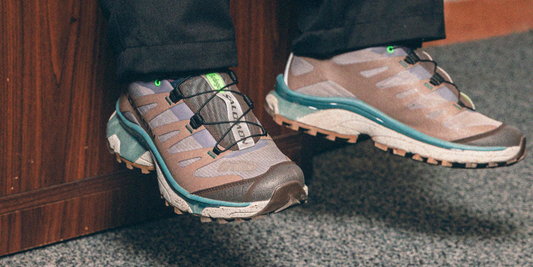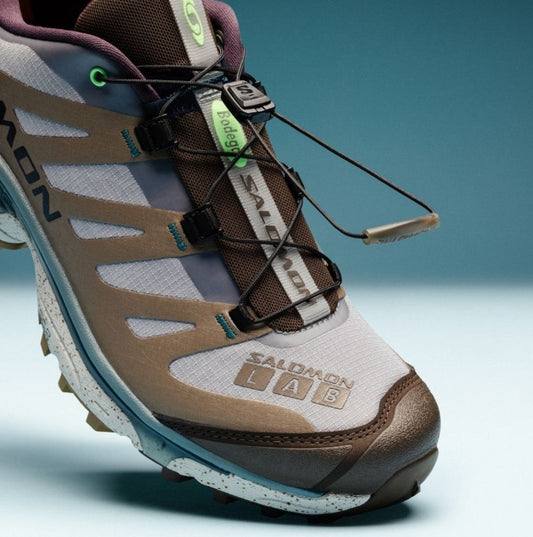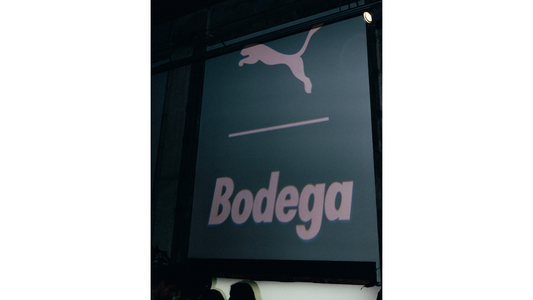Off the Grid: The Secrets and Lies of Saucony's "Lost" Shoe
Even before modern sneaker culture exposed the inner workings of the behind the scenes business of conceptualization, design and development of footwear to the public at large, most people would have been well aware of the fact that the finished product on store shelves represents only a microscopic fraction of the total work that goes into producing a shoe.
The trial and error process of concept sketches, material and color swatches and physical prototypes, not to mention the layers of corporate approval required at every step of the way, would logically leave behind a mountain of documentation, even for a project abandoned at the earliest stages. It would, therefore, test the credulity of even the most casual consumer of athletic footwear that any company could be in possession of a shoe that the company itself has no record of making. Yet, that is exactly the story that Saucony would have the public believe about one particular model, a model that started out as the first step into the future, and ended up becoming Saucony’s darkest secret, The GRID Azura 2000.
Project Azura Investigative Report
Investigative Overview Document (Declassified)
If you haven’t come across that name before, that’s no coincidence; it’s by design. Officially, the GRID Azura 2000 model never existed in the first place, and to suggest otherwise is extremely inconvenient for the top brass at Saucony. Like many of life’s inconveniences, the uncovering of this mysterious, clandestine affair actually began with a complete accident. During preliminary research into a new project, a photograph that should never have seen the light of day was discovered, having inadvertently been stuck to the back of another shoe’s file photo. After over a decade of working together, and with over 40 individual footwear styles under our collaborative belt, we thought we had seen even the most arcane corners of the Saucony archive, and yet the response to this discovery was a mixture of repressed panic and tight lipped brusqueness. The model name, GRID Azura 2000, hand written on the back side of the photo, is the only reason that the name ever, initially, made it out of the building.
Photo Release Form (left), Polaroid of GRID Azura 2000 (above)
The backdrop to an X-Files worthy conspiracy filled with classified documents, anonymously threatening, black suited men, unmarked sedans, secret meetings and the like usually occurs in the imagination as something that takes place in literal darkness with, 1:00 am meetings in deserted parking garages, or the back corner of a cigarette smoke clouded barroom. A late autumn, New England day, with sunshine, crisp air, and Holiday music echoing out of every storefront hardly seems like it would make the list. But that is an exact description of the moment when a harried looking, business suited man interrupted a post-meeting coffee by dropping a thick, yellow envelope onto the table and somewhat cryptically declaring that all the pieces of the puzzle were in there.
The original photograph has never been allowed to leave the Saucony complex, but copies have been secreted away. Although the design of the GRID Azura 2000 would be a departure from what would be considered a traditional Saucony look, it clearly bore the hallmarks of Saucony branding.
A closer examination of the mystery silhouette revealed that a departure is putting things mildly. The chunky physical forms utilized to accommodate the advancements in cushioning and guidance technology that occurred throughout the 1990s had been slimmed down significantly, a change reflected in the upper’s construction, which was dominated by lightweight, in some places, transparent mesh. The shoe possessed a more agile build, which served to amplify the impact deflection and dispersion of foot strikes of Saucony’s signature GRID technology. Stylized overlays with a wavy, saw toothed design took a more aggressive visual stance than, perhaps, any previous Saucony model. In short, the prototype suggested a shoe that was ready not just for new challenges, but for unforeseen obstacles. It’s abundantly clear that the GRID Azura 2000 was meant to be nothing less than the face of Saucony in the new millennium.
Saucony Sports Technology Emblem (left), Diagram of containment unit (right)
While most of the world decided to wait until 1999 to panic over Y2K, it seems that elements within Saucony were planning for it as far back as 1980s. According to official, internal communications dated March, 1986, a suitable facility for “advanced performance research and development” had been acquired; then, in June of 1988, the facility was deemed fully operational.
The presence of a black-ops style, advanced laboratory being operated on the campus of an athletic shoe manufacturer seems far-fetched on paper, but firsthand accounts of various Saucony employees, both at the high ranking and the rank and file level tell a different story. Former IT technicians and maintenance workers attest that the existence of a “bunker” was an open secret for years, as were anecdotes about co-workers who were given “temporary special assignments” that required security escorts and hazardous material suits. A similar phenomenon can be seen at the design level, where the presence of a “Doctor Frankenstein” type figure was a running, departmental joke. At the very highest levels, this chatter takes on a more sinister tone, with overheard exchanges about “the project” having gone too far, and capabilities that were never meant to be in the hands of regular people.
Officially, the recollections of former employees can all too easily be dismissed as idle gossip or just inaccurately remembered, but poring over the annual budgets yields some curious irregularities, which are more difficult to wave away. The numbers themselves are present and correct; there is no hidden or missing money, but certain values are, in a word, off. Six employees with redacted names are listed as “custodial trainees” with an annual salary of $550,000. An expense for “treadmill extension cords” is valued at $75,042, and another for “wrist supportive mouse pads” is for $25,992. A line item for “treadmill belts,” listed at $99,503 appears like another irregularity, but actually proved to be the key to unraveling another thread.
A former accountant at the company recalls having pressed the issue of the treadmill belt numbers. His personal copy of the financials comes with an important attachment, a sticky note reading “T.W. in special research assures TM belt #s are accurate/requests no further queries” This seemingly innocuous sign off confirms not only the existence of a separate, experimental research division with a high degree of autonomy, but also confirms that whatever was being developed there, was going through nearly a hundred treadmill belts in a single 12 month period.
The financial trail dries up in the late 1990s. In 1998, the miscellaneous expenditures that had previously been geared towards operating took on a sinister tone. Dummy items and positions were replaced by vague terms like “disposal,” “containment,” “long term storage” and dwarfing all other expenses, “concrete.” By the time of the 1999 budget release, the MISC category has disappeared entirely.
A former accountant at the company recalls having pressed the issue of the treadmill belt numbers. His personal copy of the financials comes with an important attachment, a sticky note reading “T.W. in special research assures TM belt #s are accurate/requests no further queries” This seemingly innocuous sign off confirms not only the existence of a separate, experimental research division with a high degree of autonomy, but also confirms that whatever was being developed there, was going through nearly a hundred treadmill belts in a single 12 month period.
The financial trail dries up in the late 1990s. In 1998, the miscellaneous expenditures that had previously been geared towards operating took on a sinister tone. Dummy items and positions were replaced by vague terms like “disposal,” “containment,” “long term storage” and dwarfing all other expenses, “concrete.” By the time of the 1999 budget release, the MISC category has disappeared entirely.
Copy of Testing Equipment Invoice with note.
That ends the definitive trail of the GRID Azura 2000, but there is a postscript. The most chilling account of what went on in Saucony’s clandestine laboratory comes not from someone who aided the investigative efforts, but from an outright refusal:
"I will have nothing to do whatsoever with any discussion of the GRID Azura 2000. I worked on that shoe for eleven years. I haven’t worn sneakers since. I can never be sure what was in that bunker never made it into other shoes. I know that some concrete can’t keep it underground forever. If you had any sense, you would have nothing to do with it either. Just forget you ever heard of it."
"I will have nothing to do whatsoever with any discussion of the GRID Azura 2000. I worked on that shoe for eleven years. I haven’t worn sneakers since. I can never be sure what was in that bunker never made it into other shoes. I know that some concrete can’t keep it underground forever. If you had any sense, you would have nothing to do with it either. Just forget you ever heard of it."
Copy of Request for Project [Azura] Termination
Release Info: Tuesday, February 4, 2020
Available online and in-store at our Boston location at 10am EST and in-store at our Los Angeles location at 11am PST on a first come, first served basis.







